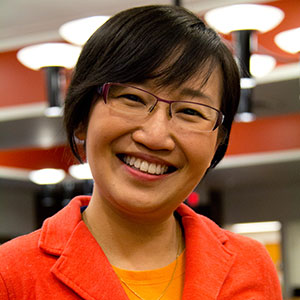Assistant Professor and Extension Nutrition Specialist Siew Sun Wong came to Oregon State in 2011 after previously working as a visiting scholar at the USDA NIFA Division of Family Consumer Science in Washington, D.C. and ARS National Nutrient Data Lab and Food Survey Research Group in Beltsville, Md. She’s also served as an assistant professor, Extension Nutrition Specialist and Utah State Director for the Expanded Food and Nutrition Education Program (EFNEP) at Utah State University. Siew Sun currently is a researcher in the CPHHS’ Moore Family Center for Whole Grain Foods, Nutrition and Preventive Health as well as the Hallie E. Ford Center for Healthy Children and Families. She earned a master’s degree and PhD from Utah State University in Logan, Utah. Fun fact: Siew Sun is an accomplished violinist and has performed in the Malaysia Symphony Orchestra.
What made you decide to get into this field of study? Is there one specific moment that inspired your career path?
“Broken hands. I was planning to be a professional violinist, but one day I suddenly realized the risks of losing my entire career if I lost my hands or fingers. So I chose health science. I was born with a low birth weight in a developing country, so I experienced and saw many preventable diseases. Human nutrition has been a very meaningful and rewarding field for me.”

What does your current research entail?
“It focuses on childhood obesity prevention. The five-year, multidisciplinary NIFA AFRI project called The WAVE~Ripples for Change integrates Extension, research and education to combine real-world and virtual-world learning experiences for 15 to 19-year-old teens engaged in soccer to prevent unhealthy weight gain. This two-year intervention will take place in Oregon with a joint effort from the College of Public Health and Human Science, the College of Engineering School of Electrical Engineering & Computer Science and Information Services at OSU, community and industry partners in Oregon, and San Diego State University.”
What sparked your interest in this topic?
“The spirit of the movie ‘Avatar.’ Today, children are tech-savvy, but they are losing life skills to build a healthy body and relationships. I want to reach out to them on common ground. This points me to the virtual world – the Internet and mobile phones. I hope to inspire them in the virtual world through positive learning experiences and see them transform positively in real life.”
How will this make a difference?
“When each teen applies what he/she learns from this intervention to make a behavior change to establish a healthy lifestyle, we turn these ripples of behavior changes into a social wave of healthy living!”
What would you say is the most fascinating aspect of this research?
“To inspire teens by giving them a positive experience in the virtual world, which they can bring back to the real world to build a better future for themselves, their families, their societies and the world.”
What do you hope is the outcome of your research?
“The goal is for active teens to adopt healthy lifestyles to prevent unhealthy weight gain, especially as they transition into adulthood.”

Are you working with anyone else in the CPHHS on this project?
“I’m working with Melinda Manore (my co-project director), Gretchen Dursch, Bo Zhang, Tonya Johnson, Cristian Curiel, Mario Magaña, Mary Arnold, Kari Pilolla, Karen Swanger and Yu Meng.”
Why is research important in the field of nutrition?
“Obesity prevention among active teens has not been studied before. It is also important to research the effectiveness and impacts of using technology, such as virtual world and affordable wearable sensors, to enhance Extension programs.”
What’s next for you? Do you have any future research projects lined up?
“I will gather talents around the world to expand the project to reach teens and young adults outside of Oregon and the U.S. No new projects are lined up yet, but I am wrapping up the Better Eating Starts Today project, a two-year study that measures longer-term impacts of HHS 231 on OSU students. We developed a smartphone app prototype to track dietary habits and bowel movements. I am excited that students find the app helpful in promoting healthy lifestyles.”
What is the best advice you’ve ever received, and who gave it?
“The Bible (Proverbs 3:5-6), ‘Trust in the LORD with all your heart and lean not on your own understanding; in all your ways submit to Him, and He will direct your paths.’”
What advice would you give to current students and recent alums?
“Three things: 1) Always give your best when you work and when you rest. 2) There are no ‘failures’ in life. Rather, these are lessons to build us up! 3) Turn everything you do into a beautiful piece of art, touched from inside out, always with love.”
What are your favorite activities to do outside of work?
“Outside of work, I like to play the piano and compose songs. A heartfelt song with meaningful lyrics can make you cheer or cry with someone you care about in many special ways. I also like to try new foods and recipes and then share the good ones with family and friends.”






